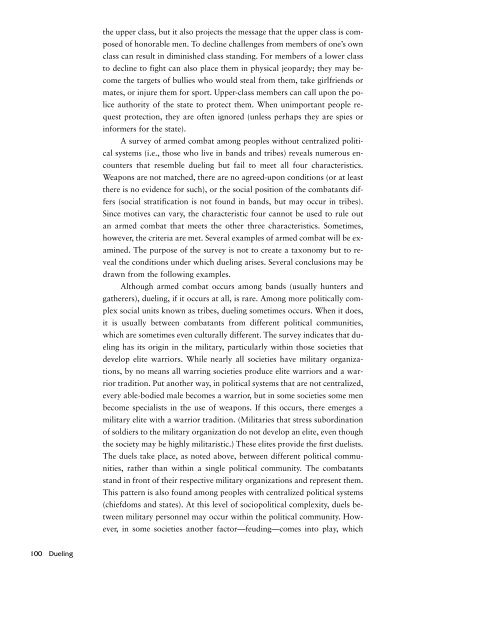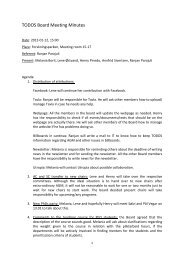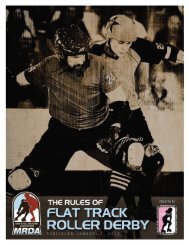- Page 1:
Martial Arts of the World
- Page 4 and 5:
Copyright © 2001 by Thomas A. Gree
- Page 6 and 7:
vi Contents Japanese Martial Arts,
- Page 9 and 10:
Editorial Board D’Arcy Jonathan D
- Page 11 and 12:
Bill Adams Director, Bill Adams Fit
- Page 13:
Kimberley Taylor University of Guel
- Page 16 and 17:
xvi Introduction the sword” in Eu
- Page 18 and 19:
xviii Introduction References Frida
- Page 21 and 22:
Africa and African America Although
- Page 23 and 24:
a range of up to 80 meters. The wou
- Page 25 and 26:
the competitors. In this respect, t
- Page 27 and 28:
Beginning in 1415, after the Portug
- Page 29 and 30:
Many African combat systems relied
- Page 31 and 32:
as a result of similar circumstance
- Page 33 and 34:
eturn strike; rather, the practitio
- Page 35 and 36:
Ranking in most aikidô dôjô is b
- Page 37 and 38:
The magic monkey Songoku from a Chi
- Page 39 and 40:
A young woman aims at a barrel of s
- Page 41:
See also Kendô; Religion and Spiri
- Page 44 and 45:
Baguazhang is closely associated wi
- Page 46 and 47:
26 Bandô ———. 1984. The Mast
- Page 48 and 49:
Chinese children in a martial arts
- Page 50 and 51:
A modern picture of a Buddhist mona
- Page 52 and 53:
32 Boxing, Chinese Shaolin Styles L
- Page 54 and 55:
A 74-year-old Buddhist monk practic
- Page 56 and 57:
Grand Master Rich Mooney demonstrat
- Page 58 and 59:
38 Boxing, Chinese Shaolin Styles h
- Page 60 and 61:
40 Boxing, Chinese Shaolin Styles m
- Page 62 and 63:
42 Boxing, Chinese Shaolin Styles (
- Page 64 and 65:
44 Boxing, European See also Animal
- Page 66 and 67:
46 Boxing, European marked the end
- Page 68 and 69:
48 Boxing, European If there is one
- Page 70 and 71: 50 Boxing, European practicality an
- Page 72 and 73: 52 Brazilian Jiu-Jitsu Gilbey, John
- Page 74 and 75: 54 Brazilian Jiu-Jitsu papers his w
- Page 76 and 77: 56 Budô, Bujutsu, and Bugei autono
- Page 78 and 79: 58 Budô, Bujutsu, and Bugei Meiji-
- Page 81 and 82: Capoeira Capoeira is a Brazilian ma
- Page 83 and 84: quiring knowledge of capoeira and t
- Page 85 and 86: early 1990s. By the late 1990s capo
- Page 87 and 88: The entries on archery, straight sw
- Page 89 and 90: Contemporary literature provides a
- Page 91 and 92: eral policies in recent years have
- Page 93 and 94: Clovis, one of the earliest Frankis
- Page 95 and 96: A candidate for knighthood, after s
- Page 97 and 98: though the weapons were blunted, th
- Page 99 and 100: wise counsel, attacked the Turkish
- Page 101 and 102: and elevated courtly love to a form
- Page 103 and 104: Combatives: Military and Police Mar
- Page 105 and 106: during the 1870s, as did the Japane
- Page 107 and 108: and 1930s, comic books and movies f
- Page 109 and 110: he beat up the British Resident. Th
- Page 111 and 112: And, with decolonization on the hor
- Page 113 and 114: Coe, Michael D., Peter Connolly, An
- Page 115: United States Army. 1992. Field Man
- Page 118 and 119: 98 Dueling duels in late eighteenth
- Page 122 and 123: 102 Dueling tribal level of sociopo
- Page 124 and 125: 104 Dueling was equipped with a coa
- Page 126 and 127: 106 Dueling theories are different,
- Page 128 and 129: 108 Dueling See also Gunfighters; M
- Page 130 and 131: 110 Europe system dates to the Egyp
- Page 132 and 133: An armored ninthcentury Franconian
- Page 134 and 135: An old German woodcut illustrating
- Page 136 and 137: 116 Europe handsprings, cartwheels,
- Page 138 and 139: 118 Europe the art vary, it is gene
- Page 140 and 141: elow the navel) by physical and spi
- Page 142 and 143: 122 External vs. Internal Chinese M
- Page 144 and 145: 124 Folklore in the Martial Arts la
- Page 146 and 147: 126 Folklore in the Martial Arts sy
- Page 148 and 149: 128 Folklore in the Martial Arts ve
- Page 150 and 151: 130 Folklore in the Martial Arts a
- Page 152 and 153: 132 Folklore in the Martial Arts tr
- Page 154 and 155: 134 Folklore in the Martial Arts wi
- Page 156 and 157: Women at an annual martial arts fes
- Page 158 and 159: 138 Form/Xing/Kata/Pattern Practice
- Page 160 and 161: In any event, one should probably n
- Page 162 and 163: 142 Gladiators in every province of
- Page 164 and 165: 144 Gladiators protection, was ligh
- Page 166 and 167: 146 Gladiators The question, of cou
- Page 168 and 169: 148 Gongfu Although providing marti
- Page 170 and 171:
A late-nineteenthcentury engraving
- Page 172 and 173:
152 Gunfighters (quoted in Horan 19
- Page 174 and 175:
154 Gunfighters fine art” (Cunnin
- Page 177 and 178:
Hankuk Haedong Kumdô See Swordsman
- Page 179 and 180:
and kyûdô (Japanese Archery). Kor
- Page 181 and 182:
ecome other thoughts. In combat app
- Page 183 and 184:
this ideology by a word meaning “
- Page 185 and 186:
largely the creation of heralds, wh
- Page 187 and 188:
Christendom gradually acquired the
- Page 189 and 190:
Iaidô Iaidô is the Japanese marti
- Page 191 and 192:
the imaginary blood is flicked off
- Page 193 and 194:
Watanabe, Tadashige. 1993. Shinkage
- Page 195 and 196:
for infantry; and for wrestling), a
- Page 197 and 198:
named after dynamic animals such as
- Page 199 and 200:
Japan The historical development an
- Page 201 and 202:
Warfare, Politics, and Society Warf
- Page 203 and 204:
egion (present-day Nara prefecture)
- Page 205 and 206:
of the Taira and the Minamoto as vi
- Page 207 and 208:
winds that blew the invading armada
- Page 209 and 210:
would be punished. The kenka ryô s
- Page 211 and 212:
improve their arsenal of weapons us
- Page 213 and 214:
fact, some of these weapons were co
- Page 215 and 216:
The periodic emphasis on the ideal
- Page 217 and 218:
of the bloody Ônin War (1467-1477)
- Page 219 and 220:
Berry, Marry Elizabeth. 1994. The C
- Page 221 and 222:
Yuanyun (1587-1671, usually pronoun
- Page 223 and 224:
for I strongly object to formality,
- Page 225 and 226:
searched and experimented with othe
- Page 227 and 228:
Bruce Lee said that Jeet Kune Do wa
- Page 229 and 230:
In 1996, Lee’s widow, Linda Lee C
- Page 231 and 232:
the “all-pervading” jûdô prin
- Page 233 and 234:
Naturally, it was immediately compa
- Page 235 and 236:
(jûdô practitioner). Older system
- Page 237:
———. 1994. Kôdôkan Judo. 19
- Page 240 and 241:
220 Kajukenbo Joseph Holck, a black
- Page 242 and 243:
222 Kajukenbo nese, and the Japanes
- Page 244 and 245:
224 Kajukenbo Kajukenbo techniques
- Page 246 and 247:
Satish Kumar (left) and Shri Ajit (
- Page 248 and 249:
228 Kalarippayattu though clearly r
- Page 250 and 251:
230 Kalarippayattu given to applica
- Page 252 and 253:
232 Kali Kali See Philippines Karat
- Page 254 and 255:
234 Karate, Japanese where he recei
- Page 256 and 257:
236 Karate, Japanese pseudonym, Sh
- Page 258 and 259:
238 Karate, Japanese terminology fo
- Page 260 and 261:
240 Karate, Okinawan ———. 199
- Page 262 and 263:
242 Karate, Okinawan gested to the
- Page 264 and 265:
244 Karate, Okinawan shionna Kanry
- Page 266 and 267:
246 Karate, Okinawan sible for havi
- Page 268 and 269:
248 Karate, Okinawan returned to Ok
- Page 270 and 271:
250 Kendô In the late Kamakura and
- Page 272 and 273:
252 Kendô only noted fencers from
- Page 274 and 275:
254 Kendô leadership, ability in j
- Page 276 and 277:
Japanese men and women practicing K
- Page 278 and 279:
258 Kenpô Kempô grand master, the
- Page 280 and 281:
260 Ki/Qi See also Kajukenbo; Karat
- Page 282 and 283:
262 Ki/Qi jujitsu. Martial artists
- Page 284 and 285:
264 Knights crossbow, or harquebus.
- Page 286 and 287:
266 Knights tury, when the benefice
- Page 288 and 289:
268 Knights vided with support in t
- Page 290 and 291:
270 Knights adopt those hereditary
- Page 292 and 293:
272 Knights hope of being knighted
- Page 294 and 295:
274 Knights acquire dominions and f
- Page 296 and 297:
276 Knights which time the tourname
- Page 298 and 299:
278 Knights their own troop and fou
- Page 300 and 301:
280 Knights Germany were probably f
- Page 302 and 303:
282 Knights glect. Instead, many ne
- Page 304 and 305:
284 Knights From the beginning of t
- Page 306 and 307:
286 Kobudô, Okinawan Kobudô, Okin
- Page 308 and 309:
288 Kobudô, Okinawan Japanese Infl
- Page 310 and 311:
290 Kobudô, Okinawan various forms
- Page 312 and 313:
Winners of an archery contest in Ko
- Page 314 and 315:
294 Korea fucianism so completely t
- Page 316 and 317:
296 Korea nese withdrawal. Moreover
- Page 318 and 319:
298 Korea KTA and changed the name
- Page 320 and 321:
including Ming general Qi Jiguang
- Page 322 and 323:
302 Koryû Bugei, Japanese koryû b
- Page 324 and 325:
304 Koryû Bugei, Japanese student
- Page 326 and 327:
306 Krav Maga Krav Maga Krav maga (
- Page 328:
Krav Maga practitioners are taught
- Page 331 and 332:
powerless for a few seconds while t
- Page 333 and 334:
Krav maga has been called the “fi
- Page 335:
Two young women demonstrate Chinese
- Page 338 and 339:
318 Masters of Defence and-death en
- Page 340 and 341:
320 Masters of Defence “Masters o
- Page 342 and 343:
322 Masters of Defence ing both in
- Page 344 and 345:
324 Masters of Defence naissance sp
- Page 346 and 347:
326 Masters of Defence the classic
- Page 348 and 349:
328 Medicine, Traditional Chinese f
- Page 350 and 351:
330 Medicine, Traditional Chinese s
- Page 352 and 353:
332 Medicine, Traditional Chinese o
- Page 354 and 355:
334 Medicine, Traditional Chinese
- Page 356 and 357:
A sculpture of Buddha in seated med
- Page 358 and 359:
338 Middle East Maliszewski, Michae
- Page 360 and 361:
340 Middle East ture battles. The c
- Page 362 and 363:
342 Middle East The oil obviously m
- Page 364 and 365:
344 Mongolia to gain punching power
- Page 366 and 367:
Two Inner Mongolian wrestlers await
- Page 368 and 369:
348 Mongolia range of up to 500 yar
- Page 370 and 371:
350 Muay Thai Sinor, Denis. 1990. T
- Page 372 and 373:
352 Muay Thai (Praditbatuga 2000).
- Page 374 and 375:
354 Muay Thai Ron Smith emphasizes
- Page 376 and 377:
356 Ninjutsu ninja boom that spread
- Page 378 and 379:
358 Ninjutsu Nobunaga in Kyoto in 1
- Page 380 and 381:
360 Ninjutsu out fatigue, breath co
- Page 383 and 384:
Okinawa Okinawa means a “rope in
- Page 385 and 386:
Sensei Ty Yocham of the Texas Okina
- Page 387 and 388:
source in Okinawa. The family opera
- Page 389 and 390:
A meeting of a branch of the Knight
- Page 391 and 392:
it one of the largest and most wide
- Page 393 and 394:
the Teutonic Knights of the Hospita
- Page 395 and 396:
in 1211 and had just been expelled
- Page 397 and 398:
the Knightly Order of St. George, f
- Page 399 and 400:
tallers of St. John wore a habit an
- Page 401 and 402:
some places grand priories, includi
- Page 403 and 404:
cipline was enforced by written reg
- Page 405 and 406:
though they normally included men f
- Page 407 and 408:
emony (principally the Knights of t
- Page 409 and 410:
and Order of the Young Male Falcon,
- Page 411 and 412:
took it upon themselves to promote
- Page 413 and 414:
Castilian court. Before he could co
- Page 415 and 416:
William, and St. George of the Peli
- Page 417 and 418:
cieties. One order—that of the Sh
- Page 419 and 420:
order in 1344, there can be little
- Page 421:
minion or domain, the monarchical o
- Page 424 and 425:
404 Pacific Islands to fight well t
- Page 426 and 427:
406 Pacific Islands was developed f
- Page 428 and 429:
408 Pacific Islands Hawaiians inclu
- Page 430 and 431:
410 Pankration References Balent, M
- Page 432 and 433:
412 Pankration feet were permitted.
- Page 434 and 435:
414 Pankration dent hit correctly,
- Page 436 and 437:
416 Pankration With the explosion o
- Page 438 and 439:
An opera singer in full costume wav
- Page 440 and 441:
420 Performing Arts can be impossib
- Page 442 and 443:
422 Philippines now internationally
- Page 444 and 445:
Warrior tribesmen of the Philippine
- Page 446 and 447:
426 Philippines his people. Althoug
- Page 448 and 449:
428 Philippines Also in the first c
- Page 450 and 451:
430 Philippines While the sixth cat
- Page 452 and 453:
432 Philippines curer (seruhana, ar
- Page 454 and 455:
434 Philippines Besides reasons of
- Page 456 and 457:
A painting of a burning station and
- Page 458 and 459:
A photo of the Ghost Dance of the A
- Page 460 and 461:
440 Political Conflict and the Mart
- Page 462 and 463:
442 Political Conflict and the Mart
- Page 465:
Martial Arts of the World
- Page 468 and 469:
Copyright © 2001 by Thomas A. Gree
- Page 470 and 471:
vi Contents Karate, Okinawan, 240 K
- Page 473:
A Note on Romanization In 1979, the
- Page 476 and 477:
Taekwondo students wear colored bel
- Page 478 and 479:
for every battle, but whenever a ma
- Page 480 and 481:
century the cross was introduced wh
- Page 482 and 483:
the mobilization of an expedition t
- Page 484 and 485:
desire of Christian princes to main
- Page 486 and 487:
The martial arts probably more ofte
- Page 488 and 489:
Shaolin Monastery, established in A
- Page 490 and 491:
ing on boxing to try to bring it up
- Page 492 and 493:
See also Boxing, Chinese; Boxing, C
- Page 494 and 495:
An Indian miniature of the defeat o
- Page 496 and 497:
In terms of formalized religious pr
- Page 498 and 499:
from these austerities is thought t
- Page 500 and 501:
Sutra of Patanjali, give scant ment
- Page 502 and 503:
Religion and Spiritual Development:
- Page 504 and 505:
tention to the relationships among
- Page 506 and 507:
from firsthand knowledge of their o
- Page 508 and 509:
spread throughout the world. It rea
- Page 510 and 511:
ity just as warriors (bushi [24]) o
- Page 512 and 513:
To counter the influence of the Bri
- Page 514 and 515:
Herrigel spoke each other’s langu
- Page 516 and 517:
Japan. Variation by region and soci
- Page 518 and 519:
to deliver the labor and taxes dema
- Page 520 and 521:
and gods and all creatures. Success
- Page 522 and 523:
Aside from magical spells, the alch
- Page 524 and 525:
Over time, the Confucian ideals pro
- Page 526 and 527:
a means of acquiring status. Lackin
- Page 528 and 529:
498 Religion and Spiritual Developm
- Page 530 and 531:
500 Religion and Spiritual Developm
- Page 532 and 533:
502 Religion and Spiritual Developm
- Page 534 and 535:
504 Religion and Spiritual Developm
- Page 537 and 538:
Sambo Sambo is an acronym (in Russi
- Page 539 and 540:
A crowd intently watches a wrestlin
- Page 541 and 542:
Upravlenije; State Intelligence Age
- Page 543 and 544:
In addition to this ranking system,
- Page 545 and 546:
A portrait of three men in Japan dr
- Page 547 and 548:
Godaigo, issued a call to arms agai
- Page 549 and 550:
Mass, Jeffrey P. 1989. Lordship and
- Page 551 and 552:
style. One should note that at this
- Page 553 and 554:
teach the techniques and logic of a
- Page 555 and 556:
are launched from very low stances,
- Page 557 and 558:
acteristics in regional styles of p
- Page 559 and 560:
gion of Indonesia and most of the p
- Page 561 and 562:
nese martial arts. The latter theor
- Page 563 and 564:
Medieval judicial combat, trial by
- Page 565 and 566:
“Philopoemen,” the Roman morali
- Page 567 and 568:
References Alford, Violet. 1962. Sw
- Page 569 and 570:
The earliest history of the region
- Page 571 and 572:
een effected. Struggles between Sia
- Page 573 and 574:
tions, silat has been an element of
- Page 575 and 576:
An advertisement for Burmese boxing
- Page 577 and 578:
and unlike contemporary Krabi krabo
- Page 579 and 580:
modeled on the spurring talons of t
- Page 581 and 582:
Ryan, N. J. 1976. A History of Mala
- Page 583 and 584:
English actor, producer, and direct
- Page 585 and 586:
moves, the actors and the choreogra
- Page 587 and 588:
a gibbet immediately outside the li
- Page 589 and 590:
lades being replaced by an ash stic
- Page 591 and 592:
techniques have been part of savate
- Page 593 and 594:
tises that stickfighting competitio
- Page 595 and 596:
Dressed in traditional garb, sword-
- Page 597 and 598:
As a result of the first invasion,
- Page 599 and 600:
Zen masters, however, did not thems
- Page 601 and 602:
strength, stamina, and ferociousnes
- Page 603 and 604:
and actively, defensively and offen
- Page 605 and 606:
to stand up against increasingly he
- Page 607 and 608:
there were three principal actions
- Page 609 and 610:
to the Eighteenth Century. 1885. Re
- Page 611 and 612:
the period clearly demonstrates tha
- Page 613 and 614:
sponse to the use of cut-and-thrust
- Page 615 and 616:
the late Renaissance as a personal
- Page 617 and 618:
classical fencing and sport fencing
- Page 619 and 620:
evolved over more than two thousand
- Page 621 and 622:
(third-fifth centuries A.D.), when
- Page 623 and 624:
A color woodblock print of a duel b
- Page 625 and 626:
Another form subscribed to combat s
- Page 627 and 628:
tainment that belongs in samurai mo
- Page 629 and 630:
Hankuk Haedong Kumdô students Glen
- Page 631 and 632:
through their perceptions, understa
- Page 633 and 634:
T’aek’kyŏn T’aek’kyŏn is
- Page 635 and 636:
distinct identity, with a common fo
- Page 637 and 638:
Each t’aek’kyŏn association in
- Page 639 and 640:
Side kick delivered by Miss Kim, ca
- Page 641 and 642:
In 1955, General Choi Hong-Hi, know
- Page 643 and 644:
ing, as it is successful kicks that
- Page 645 and 646:
plexus, and ribs; and groin protect
- Page 647 and 648:
emphasis is placed on tournament fi
- Page 649 and 650:
Group practice of taijiquan in Beij
- Page 651 and 652:
Yang Chengfu made the form smooth,
- Page 653 and 654:
powerful larger, sweeping, striking
- Page 655 and 656:
tablished. The earth’s energy/for
- Page 657 and 658:
Choreographed two-person sets are a
- Page 659 and 660:
———. 1983. T’ai-Chi Touchst
- Page 661 and 662:
Two Kachin tribesmen near Bhamo, My
- Page 663 and 664:
Branches of Thaing Bandô, the most
- Page 665 and 666:
Outside Myanmar, thaing is represen
- Page 667 and 668:
martial art. As a result, its metho
- Page 669 and 670:
Advanced acrobatic and sword skills
- Page 671 and 672:
and those warriors who possess this
- Page 673 and 674:
Doshi, Saryu, ed. 1989. Dances of M
- Page 675 and 676:
Practitioners of kendô, the Japane
- Page 677 and 678:
Varma Ati Tamil term literally tran
- Page 679 and 680:
in this system. There are three set
- Page 681 and 682:
One day [Chattambi Swamigal] was on
- Page 683 and 684:
vinam’s popularity is demonstrate
- Page 685 and 686:
1964, Viet Vo Dao was added to the
- Page 687:
senior master of Vovinam. Worldwide
- Page 690 and 691:
660 Warrior Monks, Japanese/Sôhei
- Page 692 and 693:
662 Warrior Monks, Japanese/Sôhei
- Page 694 and 695:
664 Wing Chun Ch’uan Renondeau, G
- Page 696 and 697:
666 Women in the Martial Arts ity o
- Page 698 and 699:
A depiction of the mighty female wa
- Page 700 and 701:
670 Women in the Martial Arts About
- Page 702 and 703:
672 Women in the Martial Arts About
- Page 704 and 705:
674 Women in the Martial Arts boxin
- Page 706 and 707:
676 Women in the Martial Arts named
- Page 708 and 709:
678 Women in the Martial Arts weak
- Page 710 and 711:
680 Women in the Martial Arts in wh
- Page 712 and 713:
682 Women in the Martial Arts Freem
- Page 714 and 715:
Yip, Chun, with Danny Connor. 1993.
- Page 716 and 717:
Women boxers in Washington, ca. 197
- Page 718 and 719:
participation and success by women
- Page 720 and 721:
A woman in Beijing performing a wus
- Page 722 and 723:
692 Women in the Martial Arts: Japa
- Page 724 and 725:
694 Women in the Martial Arts: Japa
- Page 726 and 727:
696 Women in the Martial Arts: Japa
- Page 728 and 729:
698 Women in the Martial Arts: Japa
- Page 730 and 731:
700 Women in the Martial Arts: Japa
- Page 732 and 733:
702 Women in the Martial Arts: Japa
- Page 734 and 735:
704 Women in the Martial Arts: Japa
- Page 736 and 737:
706 Wrestling and Grappling: China
- Page 738 and 739:
708 Wrestling and Grappling: China
- Page 740 and 741:
710 Wrestling and Grappling: Europe
- Page 742 and 743:
712 Wrestling and Grappling: Europe
- Page 744 and 745:
714 Wrestling and Grappling: Europe
- Page 746 and 747:
716 Wrestling and Grappling: Europe
- Page 748 and 749:
718 Wrestling and Grappling: Europe
- Page 750 and 751:
720 Wrestling and Grappling: India
- Page 752 and 753:
722 Wrestling and Grappling: India
- Page 754 and 755:
724 Wrestling and Grappling: India
- Page 756 and 757:
726 Wrestling and Grappling: India
- Page 758 and 759:
728 Wrestling and Grappling: Japan
- Page 760 and 761:
730 Wrestling and Grappling: Japan
- Page 762 and 763:
732 Wrestling and Grappling: Japan
- Page 764 and 765:
734 Wrestling and Grappling: Japan
- Page 766 and 767:
736 Wrestling, Professional In Irel
- Page 768 and 769:
738 Wrestling, Professional Russian
- Page 770 and 771:
740 Wrestling, Professional les and
- Page 772 and 773:
742 Wrestling, Professional 1987 th
- Page 774 and 775:
744 Wrestling, Professional Editors
- Page 776 and 777:
746 Written Texts: China ual change
- Page 778 and 779:
748 Written Texts: China See also B
- Page 780 and 781:
750 Written Texts: India of local m
- Page 782 and 783:
752 Written Texts: India Beginning
- Page 784 and 785:
754 Written Texts: India sourcebook
- Page 786 and 787:
756 Written Texts: India skritized
- Page 788 and 789:
758 Written Texts: Japan Hart, Geor
- Page 790 and 791:
Early-fourteenth-century scroll fra
- Page 792 and 793:
762 Written Texts: Japan ture of he
- Page 794 and 795:
764 Written Texts: Japan of them ha
- Page 796 and 797:
766 Written Texts: Japan inkblots w
- Page 798 and 799:
768 Written Texts: Japan the develo
- Page 800 and 801:
770 Written Texts: Japan Suzuki, Da
- Page 802 and 803:
772 Written Texts: Japan
- Page 805 and 806:
Xingyiquan (Hsing I Ch’uan) Of th
- Page 807 and 808:
A student practices xingyiquan at t
- Page 809:
Tang, Sun Lu. 1993. Xing Yi Quan Xu
- Page 812 and 813:
Undated photo of the legendary Gran
- Page 814 and 815:
784 Yongchun/Wing Chun changer). Ch
- Page 816 and 817:
786 Yongchun/Wing Chun Green, Thoma
- Page 818 and 819:
About 1500 B.C. Near the ford at Ja
- Page 820 and 821:
About 460 B.C. The Hellenic histori
- Page 822 and 823:
141 cont. animals themselves, the a
- Page 824 and 825:
Eighth century Vishnaivite monks li
- Page 826 and 827:
Tenth century A Punjabi weaver call
- Page 828 and 829:
1077 The Song-dynasty scholar Zhao
- Page 830 and 831:
1191 Chinese mathematicians start e
- Page 832 and 833:
About 1345 cont. on the fifth hour
- Page 834 and 835:
1416 cont. Chinese destroyed it in
- Page 836 and 837:
About 1540 East Asian patent medici
- Page 838 and 839:
1570 By doing single backward aeria
- Page 840 and 841:
1624 Needing sugar to make their gi
- Page 842 and 843:
1671 cont. tradition his discussion
- Page 844 and 845:
About 1755 Toward reducing the risk
- Page 846 and 847:
1780 cont. though they worked well,
- Page 848 and 849:
About 1830 Irish immigrants introdu
- Page 850 and 851:
1858 On October 13, an Austin, Texa
- Page 852 and 853:
1881 The Japanese army replaces neo
- Page 854 and 855:
1911 soldier with patriotic conform
- Page 856 and 857:
1932 An El Paso saddler named Sam M
- Page 858 and 859:
1952 cont. progress. Therefore the
- Page 860 and 861:
Alter, Joseph S. 1992. The Wrestler
- Page 862 and 863:
Gies, Frances, and Joseph Gies. 199
- Page 864 and 865:
Maenchen-Helfen, Otto J. 1973. The
- Page 866 and 867:
Runciman, Stephen. 1980. The First
- Page 869 and 870:
AAU. See Amateur Athletic Union ABA
- Page 871 and 872:
and spiritual development: Japan Ar
- Page 873 and 874:
Bond, James, 89 Bonebreaking (hakih
- Page 875 and 876:
Cambodia, 541-542 history of, 541-5
- Page 877 and 878:
Choi Yong-Shul, 157, 159, 160, 296
- Page 879 and 880:
Dandi, 176 Dang Vu Hy, 652 Dangals,
- Page 881 and 882:
Espada y daga, 560 Espinosa, Leo, 5
- Page 883 and 884:
Fundai, 188 Funeral games, 788 Fune
- Page 885 and 886:
Guts Muths, Johann, 816 Gymnasiums,
- Page 887 and 888:
and dueling, 99-100 and social uses
- Page 889 and 890:
and battle, engaging in, 193 and Br
- Page 891 and 892:
303, 445-446, 478-479, 768, 822, 82
- Page 893 and 894:
Kobayashi Seiko, 702 Kobudô, 823 K
- Page 895 and 896:
Emperor Li Tsun-I, 23-24 Li Yiyu, 6
- Page 897 and 898:
May Day, 801 Maybray, John C., 738
- Page 899 and 900:
Motobu Chôyû, 258, 365 Motte, Mad
- Page 901 and 902:
Nomi-no-Sukune, 729 Nonaction (wuwe
- Page 903 and 904:
Oshchepkov, Vasilij Sergevich, 88,
- Page 905 and 906:
Popes and dueling, 105 Popular pres
- Page 907 and 908:
Ring names, 808 Ringeck, Sigmund, 3
- Page 909 and 910:
Self-Defense Krav Maga, 310 Self-De
- Page 911 and 912:
Song Shuming, 824 Song Tŏk-ki, 604
- Page 913 and 914:
and gladiators, 142 in Japan, 478-4
- Page 915 and 916:
Temple guardians, 794 Temple of Ang
- Page 917 and 918:
Tyrs, Miroslav, 820 Tyson, Mike, 74
- Page 919 and 920:
Weapons and Africa, 1-3 and aikidô
- Page 921 and 922:
and tournaments, 706 and training,
- Page 923 and 924:
Yang Aner, 691 Yang Banhou, 620-621
- Page 925:
About the Author Thomas A. Green ea

















